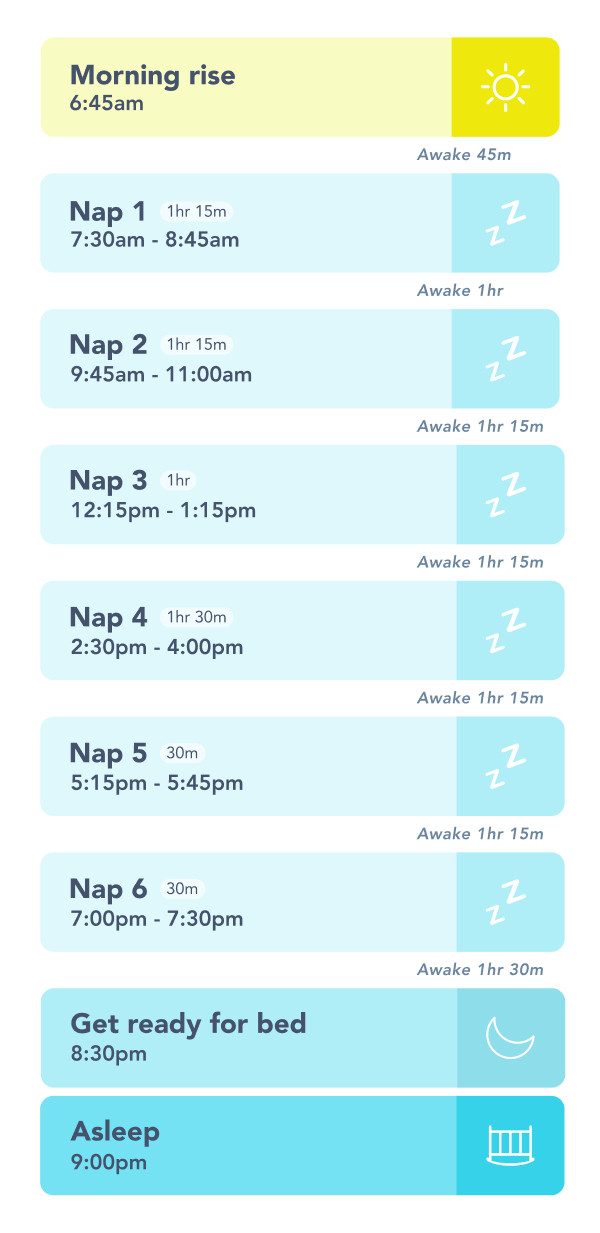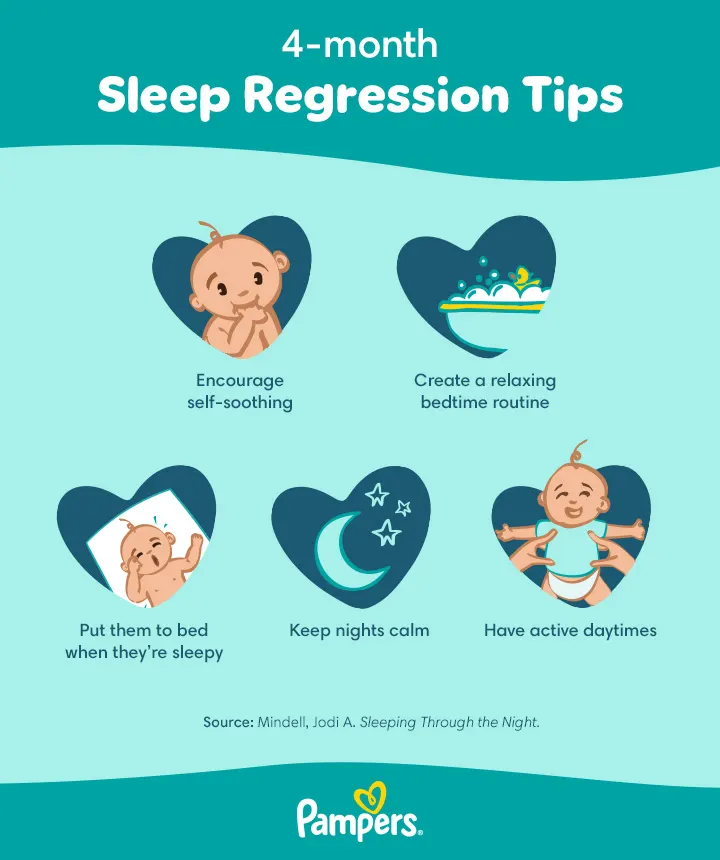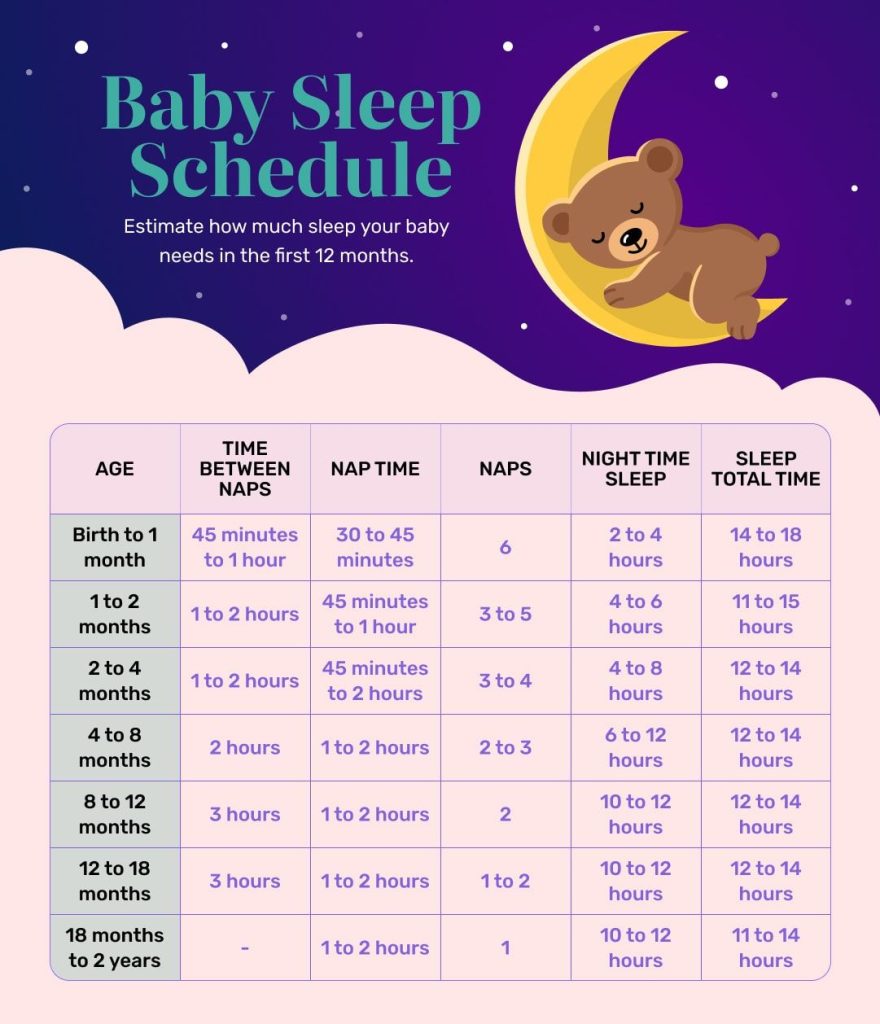The best baby sleep schedule includes consistent nap times and a bedtime routine. It ensures the baby gets adequate rest.
Establishing a baby sleep schedule is crucial for the infant’s development and well-being. Consistent nap times and bedtime routines help regulate the baby’s internal clock. This consistency aids in better sleep quality and longer sleep durations. A predictable schedule also provides parents with much-needed structure and predictability.
Ensuring the baby gets the right amount of sleep can improve their mood, behavior, and overall health. Parents should consider the baby’s age and adjust the schedule accordingly as they grow. Keeping the sleep environment calm and quiet further supports good sleep habits.
Importance Of Baby Sleep
Sleep is crucial for babies. It impacts their growth and development. A consistent sleep schedule ensures they get enough rest. Understanding its importance helps parents create the best routine.
Benefits For Growth
Sleep contributes to a baby’s physical growth. During sleep, their body releases growth hormones. These hormones help in building muscles and tissues. Babies need more sleep than adults. Here’s a table to illustrate average sleep needs:
| Age | Hours of Sleep |
|---|---|
| Newborn (0-3 months) | 14-17 hours |
| Infant (4-11 months) | 12-15 hours |
| Toddler (1-2 years) | 11-14 hours |
Ensuring they sleep well supports their body’s growth. It helps them stay healthy and active.
Impact On Development
Sleep affects a baby’s brain development. Good sleep enhances learning and memory. Babies process new information while sleeping. It helps them develop cognitive skills.
- Improves language skills
- Boosts emotional regulation
- Strengthens social interactions
Sleep also impacts mood and behavior. Well-rested babies are happier and less fussy. It helps them explore their environment better. Consistent sleep schedules lead to better overall development.
Common Sleep Challenges
Parents often face many challenges when trying to establish a baby sleep schedule. Understanding these common issues can help you better manage your baby’s sleep.
Frequent Night Wakings
Babies wake up often during the night. This is normal but can be exhausting for parents. Night wakings can happen due to hunger, discomfort, or separation anxiety.
To reduce night wakings, ensure your baby is well-fed before bed. Create a cozy sleep environment. Use a white noise machine to block out sudden noises. Keep nighttime interactions calm and quiet. This helps signal to your baby that it’s time to sleep.
Nap Time Struggles
Naps are essential for your baby’s growth and development. But getting your baby to nap can be a challenge. They might resist napping due to overstimulation or overtiredness.
To ease nap time struggles, establish a consistent nap routine. This could include a short story, dimming the lights, and some quiet time. Keep nap times consistent each day. This helps your baby know when it’s time to sleep.
Here’s a quick guide to nap schedules by age:
| Age | Number of Naps | Total Nap Time |
|---|---|---|
| 0-3 months | 4-5 naps | 4-5 hours |
| 4-6 months | 3-4 naps | 3-4 hours |
| 7-9 months | 2-3 naps | 2-3 hours |
| 10-12 months | 2 naps | 2-3 hours |
Creating a sleep-friendly environment for naps is important. Use blackout curtains to darken the room. Keep the room cool and quiet. This helps your baby fall asleep and stay asleep longer.
Newborn Sleep Patterns
Understanding newborn sleep patterns is crucial for new parents. Newborns have unique sleep habits that differ from older babies and adults. This section will explore the typical sleep patterns of newborns, focusing on sleep duration and the interplay between feeding and sleeping.
Sleep Duration
Newborns need a lot of sleep. On average, they sleep between 14 to 17 hours each day. This sleep is often broken up into short bursts. The longest sleep period usually lasts 2 to 4 hours.
Here is a simple table to understand newborn sleep duration:
| Age | Total Sleep (Hours) | Sleep Sessions |
|---|---|---|
| 0-2 weeks | 16-18 | Multiple (1-3 hours each) |
| 2-4 weeks | 16-17 | Multiple (1-3 hours each) |
| 1-2 months | 14-16 | Multiple (2-4 hours each) |
Feeding And Sleeping
Feeding plays a big role in a newborn’s sleep pattern. Newborns often wake up to feed every 2 to 3 hours. Feeding sessions can last 20 to 40 minutes.
- Frequent feeding helps with growth.
- Babies may sleep better with a full tummy.
- Expect irregular sleep-wake cycles.
Here are some tips to manage feeding and sleeping:
- Keep a sleep and feeding log.
- Feed the baby when they show hunger signs.
- Ensure a calm and quiet sleep environment.
Understanding and following these patterns can help create a healthy sleep schedule for your newborn.

Credit: www.whattoexpect.com
Infant Sleep Schedule
Creating a consistent sleep schedule for your baby is essential. It helps them get the rest they need for healthy growth. This guide will help you understand the ideal infant sleep schedule.
Ideal Bedtime
Setting an ideal bedtime can help your baby sleep better. Most infants benefit from a bedtime between 6:30 PM and 8:30 PM. This time frame aligns with their natural circadian rhythms.
A consistent bedtime routine can also help. Activities like a warm bath, gentle massage, or a bedtime story can signal it’s time to sleep.
Daytime Naps
Daytime naps are crucial for your baby’s health. Infants usually need multiple naps during the day. Here’s a general guideline:
| Age | Naps per Day | Total Nap Time |
|---|---|---|
| 0-3 months | 4-5 naps | 4-5 hours |
| 3-6 months | 3-4 naps | 3-4 hours |
| 6-12 months | 2-3 naps | 2-3 hours |
Keep nap times consistent to help your baby develop a routine. Avoid letting your baby nap too close to bedtime. This helps ensure they are tired enough to sleep through the night.
Toddler Sleep Needs
Toddlers need plenty of sleep for their growth and development. They require between 11 to 14 hours of sleep daily. This includes naps and nighttime sleep. A good sleep schedule is essential for their well-being.
Transition To One Nap
Most toddlers transition to one nap between 15 to 18 months. Signs include resisting the morning nap and longer awake times. The nap should ideally be in the afternoon, lasting 1.5 to 2 hours. This helps balance their sleep needs throughout the day.
Here’s a simple table to understand the transition:
| Age | Number of Naps | Duration |
|---|---|---|
| 12-15 months | 2 naps | 1-1.5 hours each |
| 15-18 months | 1 nap | 1.5-2 hours |
Nighttime Routine
A consistent nighttime routine is crucial for toddlers. It signals that bedtime is near and helps them wind down. The routine should be calm and soothing, lasting about 30 minutes.
Here’s a simple nighttime routine:
- Bath time
- Brush teeth
- Read a book
- Singing a lullaby
- Bedtime
Ensure the sleep environment is dark, quiet, and cool. This helps toddlers sleep better and longer.

Credit: takingcarababies.com
Creating A Sleep-friendly Environment
Creating a sleep-friendly environment is crucial for your baby’s rest. The right conditions can help your baby sleep longer and more soundly. This guide will cover the key aspects of an ideal sleep environment.
Room Temperature
The room temperature is a major factor in your baby’s sleep quality. Keeping the room between 68°F and 72°F is ideal. This range is comfortable and safe for most babies.
Tips for maintaining the right temperature:
- Use a room thermometer to monitor temperature.
- Avoid heavy blankets and opt for lightweight sleepwear.
- Ensure good ventilation without direct drafts.
Noise Control
Babies are sensitive to noise, so controlling sound levels is essential. A quiet room can make a big difference in your baby’s sleep quality.
Ways to control noise:
- Use white noise machines to mask sudden sounds.
- Keep the room away from high-traffic areas.
- Install soundproof curtains or window inserts.
These steps can help create a peaceful sleep environment for your baby.
Expert Tips For Better Sleep
Getting your baby to sleep well is essential. Experts have shared some valuable tips. These tips can help ensure your baby gets the best rest. Read on to discover the secrets to better baby sleep.
Consistent Routine
A consistent routine is key to better sleep. Babies thrive on predictability. Set a regular bedtime and wake-up time. Stick to this schedule daily. This helps regulate their internal clock.
Include calming activities in the bedtime routine. A warm bath, storytime, and gentle rocking can signal it’s time to sleep. Keep the routine short and simple. This makes it easier to follow.
| Activity | Time |
|---|---|
| Bath | 10 minutes |
| Storytime | 10 minutes |
| Rocking | 5 minutes |
Soothing Techniques
Soothing techniques can calm a fussy baby. These methods help your baby relax. Try swaddling your baby snugly. This mimics the feeling of the womb. Use white noise machines. These create a constant, soothing sound.
Gentle rocking or swinging can also be effective. Babies often find this motion comforting. Another tip is to use a pacifier. Sucking can naturally calm a baby.
- Swaddling
- White noise
- Gentle rocking
- Pacifier
Implement these expert tips for a better baby sleep schedule. Consistency and soothing techniques can make a big difference. Your baby will rest well, and so will you.
When To Seek Professional Help
Every baby is unique, and sleep patterns can vary. Most babies develop a consistent sleep schedule. But sometimes, you might need professional help. Knowing when to seek help is crucial for your baby’s health.
Signs Of Sleep Disorders
Some signs indicate potential sleep disorders. Watch for these signs:
- Excessive Crying: Your baby cries a lot and seems restless.
- Snoring: Loud snoring can signal breathing issues.
- Frequent Night Waking: Waking multiple times at night.
- Difficulty Falling Asleep: Takes a long time to fall asleep.
These signs may suggest a sleep disorder. Early detection is key to proper treatment.
Consulting A Pediatrician
If you notice any signs, consult a pediatrician. They can offer guidance. Here is a list of steps to follow:
- Make a list of your baby’s sleep issues.
- Track your baby’s sleep patterns for a week.
- Schedule an appointment with the pediatrician.
- Discuss your observations during the visit.
- Follow the pediatrician’s advice and monitor progress.
Pediatricians have the expertise to diagnose and treat sleep disorders. Early intervention ensures better sleep for your baby.

Credit: huckleberrycare.com
Frequently Asked Questions
What Is The Ideal Baby Sleep Routine?
An ideal baby sleep routine includes consistent bedtime, a soothing pre-sleep ritual, and a quiet, dark environment. Ensure daytime naps and avoid overstimulation before sleep.
What Is A Healthy Baby Sleep Schedule?
A healthy baby sleep schedule includes 14-17 hours of sleep for newborns and 12-15 hours for infants. Establish a consistent bedtime routine. Ensure naps are regular.
What Are The Best Sleeping Hours For Baby?
The best sleeping hours for a baby vary by age. Newborns need 14-17 hours, while infants need 12-15 hours.
What Is The Best Time For A Baby To Sleep?
The best time for a baby to sleep is between 7 PM and 8 PM. This aligns with their natural circadian rhythm.
What Is The Ideal Baby Sleep Schedule?
A consistent routine with naps and night sleep promotes healthy sleep habits for babies.
Conclusion
Finding the best baby sleep schedule can be challenging but rewarding. Consistency and understanding your baby’s needs are key. Every baby is unique, so be patient. Establish a routine that works for your family. With time, your baby will develop healthy sleep patterns, ensuring restful nights for everyone.


